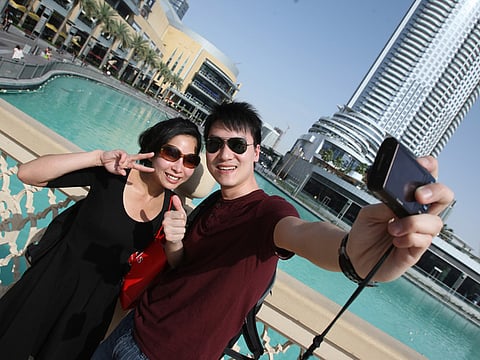Could posting selfies be a sign of low self-esteem?
Psychologist addresses the link between constantly posting selfies and a person’s self-confidence, body image, and need for attention

Dubai: While ‘selfie’ might have been named the word of the year in 2013, the habit of constantly taking pictures of yourself and posting them online could be a sign of low self-esteem and lack of confidence, a psychologist said.
Growing up in the ‘i-generation’, many adolescents and young adults have fallen into the pattern of taking dozens of selfies every day and posting them on social media sites such as Facebook and Instagram with the expectation of receiving praising comments and a high number of likes.
Dr Saliha Afridi, clinical psychologist and director of LightHouse Arabia in Dubai told Gulf News that those who grew up using social media show more traits of personality disorders. “Social media and sharing of the self on the different platforms can encourage individuals to be more self absorbed, self obsessed, and display other narcissistic traits.”
The approval, recognition and appreciation that people get from posting pictures and getting ‘likes’ on their selfies can feed into a person being more self absorbed. Some tend to derive their self-esteem from the recognition and validation they get from their online network, explained Dr Afridi.
She pointed out that some researchers are looking in to how selfies can actually make a person feel good about themselves because they are in control of the outcome of the picture.
“More control equals more confidence and higher [self-] esteem. This sense of control can be seen in pictures where the person smiles more, and then posts the best version of themselves to the social platform,” she said.
Dubai resident Dalia Al Mozhazy, 24, from Egypt, said she takes between five and ten selfies during the weekdays and around 15-20 during the weekends, but does not necessarily post them all. “Its something I enjoy doing. I know my good angles and poses and I like to be in control of my own picture,” she said. Dalia pointed out that the new smartphones that offer the option of the front camera have also made it easier to take selfies. “I take selfies to document special moments and I like to post some of the ones look really good in. This way, I know that if I ever lose my phone or my laptop jams, I can get a copy of the best pictures from social media.”
While it’s important to keep in mind that “not all selfies are created equal”, Dr Afridi pointed out that some people take selfies to document their travels and important life events and not necessarily for the purpose of posting them online.
Another Dubai resident Razan Moosa, from Palestine, said she takes around 20 selfies a day to document different moments, which she then sends to her close family and friends. “I post two to three pictures or selfies on Instagram a month, but I tend to send most of my selfies to family and close friends on group chats on Whatsapp,” said Razan.
Body-image
Considering that not all selfie-takers get into the habit for the same reason, Dr Afridi pointed out that poor body image has been on the rise and in its extreme forms can present a clinical issue such as an eating disorder or Body Dysmorphic Disorder.
Highlighting the constant bombardment of ‘fitness accounts’ or ‘fashion and make-up accounts’ online, Dr Afridi said it can make a vulnerable person susceptible to such clinical disorders.
“Social media is not just to blame, but all media channels bombard people with unrealistic images of female ‘beauty’ and, as humans, people are going to compare themselves to others on social media and want to present themselves in a positive light.”
Advising selfie addicts to better understand why they post several self-images a day, Dr Afridi also said it is important to identify how their self-esteem and confidence needs are met.
“The key is to keep things in perspective, continue to take the selfies, but avoid the trap of constantly posting them. If you are posting them, then understand your motivations,” she said.



